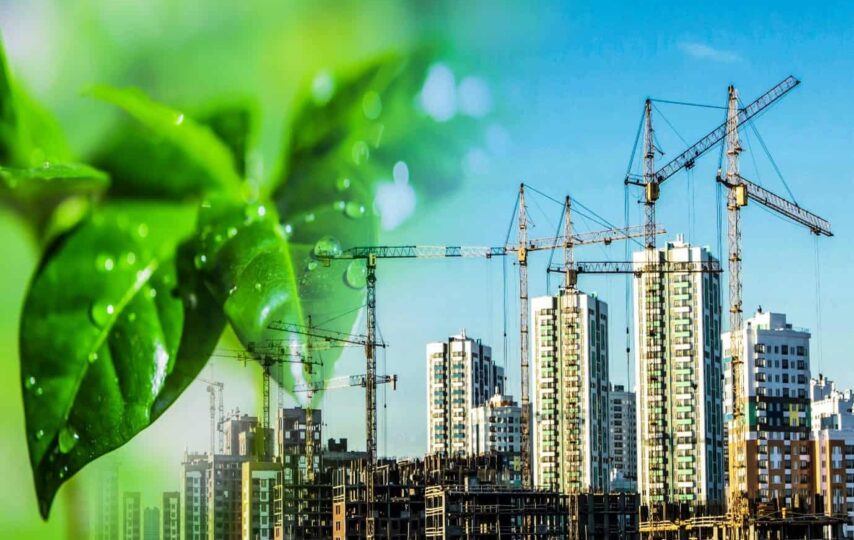Scientists, activists, and politicians continue to impress the importance of protecting the environment. Their words and actions are making a difference, even if the timetable for change could be vastly improved yet still.
In 2020, it was reported that a third of UK households had become more eco-friendly since the pandemic began. It’s hard to imagine activity decreasing in the two subsequent years as activism and government policies increase in frequency.
Because people are now acutely aware of environmental issues, firms can’t afford to be caught slacking. Construction companies are not exempt from this; they also must address how they impact the world around them with their activities.
Still, newcomers to the sector may not yet understand their responsibilities. Concerned samaritans may want to know how to hold these firms to account if they’re failing in their obligations. If you fit either of these categories, then here are the top environmental concerns construction firms should take seriously.
Waste Management
Unfortunately, at the end of 2021, it was reported that the construction industry was responsible for a third of the world’s waste overall. Few people would be surprised by such data, and it’s easy to see why individual firms need to review their processes and ensure they’re not contributing to these problems.
All construction firms should have a robust Waste Management Plan all workers can adhere to. Materials should be re-used, recycled, or stored safely when no longer required. Waste facilities should be appropriate for each phase of a construction project, so there’s no uncertainty or inaction on site. Recycling containers should be placed near general waste containers to prevent lazy colleagues from misusing them.
Progress should be continually reviewed throughout a construction project. Who’s in charge of the waste audit, and what are their findings? How are recyclables and wastes moved around a site as needed? Do suppliers have any ‘take back’ schemes that can be utilised? Can local community projects re-use any waste the site is hoarding?
Wate management is a constant process. All workers need to be on board with these processes too. Training can ensure the latest processes are followed. Visual learning and signposts are vital in these matters, providing a shorthand that all construction crews can understand.
Survey Logistics
Construction firms must go through the proper processes to protect the environment and ultimately secure planning permission. Surveys are a big part of that equation, but securing them isn’t always easy or efficient.
A diligent and trusted third party is required to ensure surveys proceed steadily. Construction firms will need to look into this further with Arbtech whether they need a tree, newt, bat, or reptile survey. Their consistently positive reviews, free quotes, and years of experience should inspire confidence. All construction firms need to do is call them or fill in their online form to get things underway.
The experience of surveying land can be quick and clean or tedious and arduous. While mandatory checks are necessary, they should enhance a firm’s prospects rather than feel like roadblocks that frustrate other key processes. Construction firms must seize that moment and work with competent surveyors only to ensure they’re doing as much good as possible, rather than just ticking boxes.
Mounting Emissions
Construction firms should endeavour to work at a local level. It can help them run a more sustainable operation.
One of the main perks of this is reducing emissions. Those delivering goods will have less distance to cover, and thus their vehicles have less fuel to consume. Additionally, construction firms could introduce the use of conveniently situated distribution facilities. State-of-the-art consolidation centres can be highly resourceful and reduce the need and frequency of gas-guzzling vehicles.
It can be easy for firms of any kind to get lost in the monotony of a routine. Some might even think little of them. Because construction firms regularly distribute resources to their construction sights, they need to be more hyper-aware of how many trips are being made and under what circumstances. Paying closer attention to these factors can make a big difference.
Noise Pollution
Surveys are useful and mandatory, but other creatures should be considered for reasons beyond lawful duties. There’s a general assumption that noise pollution is something that irritates people near a construction site. Sadly, it can harm wildlife too.
These problems can be exacerbated so badly that some creatures struggle to survive completely. For example, many creatures rely on acoustic signals for communication. If their efforts are drowned out, they may feel isolated, anxious, unsafe, or desert their homes entirely. Migration patterns can be disrupted.
Surveys can address some of these problems. Nevertheless, no construction site shouldn’t be making a needless amount of noise today, especially if they’re away from urban areas. It’s always a good idea to have volume control be a key consideration, so a quiet radio and calm conversations can help make progress here. After all, who knows what creatures are around?
Supplier Reputations
Non-compliance with sustainability measures quickly earns firms in any sector a bad reputation. Though a construction firm may fine-tune its own processes, being associated with controversial partners can be enough to undermine all their hard work.
Construction firms should hold their partners to the same high standards they hold themselves. Values need to be designed so clients can find character consistency and build trust. Otherwise, there is a risk people will assume that the construction firm is perpetuating and funding other the complacency of other companies.
Are suppliers working to reduce raw material production long-term? Can any parallels be drawn in waste management techniques? Is the supplier open to detailing their processes online? Do other businesses they work with adhere to similar standards? In the end, there can be a chain of influence here, and where construction firms find themselves in it matters.
Conclusion
Construction firms can only address many environmental concerns if they can think about others’ needs strategically. While internal processes should always be changed for compliance, they should always be in service of clients and the wider public. There’s no room for half measures with a problem like sustainability, so a high degree of diligence is required in addressing all of these challenges.



